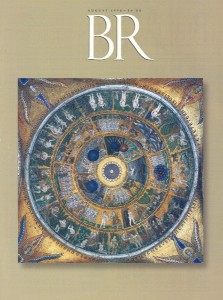Does the phrase “son of man,” which appears in all four Gospels, simply identify Jesus as the Messiah, as scholars have long supposed? Or is there more to it? One way to find out is to consult sources contemporaneous with the Gospels; and there the plot thickens. In the Aramaic of Jesus’ day, “son of man” sometimes means a human being like any other, a man among men—a usage that also appears in the Gospels (see Matthew 8:20//Luke 9:58). But in other sources, such as the Book of Daniel (c. mid-second century B.C.), the phrase refers to an angelic being close to God; this usage also occurs in the Gospels (see Mark 8:38). So Bruce Chilton asks, “The Son of Man—Who Was He?” Sifting through the diverse uses of the phrase, Chilton develops his own interpretation of what Jesus meant when he spoke of the Son of Man.

Chilton is Bernard Iddings Bell Professor of Religion at Bard College, in Annandale-on-Hudson. An expert on the New Testament, early Judaism and the Targumim (Aramaic paraphrases of biblical texts), Chilton has written 20 books and 80 articles on these subjects, including A Feast of Meaning (Brill), Beginning New Testament Study (Eerdmans and SPCK) and, most recently, Pure Kingdom: Jesus’ Vision of God (Eerdmans). His article, “The Eucharist—Exploring its Origins,” appeared in the December 1994 BR.
Already a library member? Log in here.
Institution user? Log in with your IP address.

